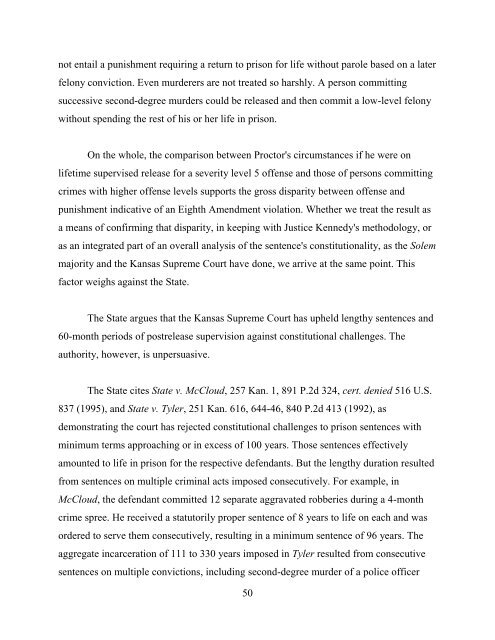State v. Proctor - Kansas Judicial Branch
State v. Proctor - Kansas Judicial Branch
State v. Proctor - Kansas Judicial Branch
Create successful ePaper yourself
Turn your PDF publications into a flip-book with our unique Google optimized e-Paper software.
not entail a punishment requiring a return to prison for life without parole based on a later<br />
felony conviction. Even murderers are not treated so harshly. A person committing<br />
successive second-degree murders could be released and then commit a low-level felony<br />
without spending the rest of his or her life in prison.<br />
On the whole, the comparison between <strong>Proctor</strong>'s circumstances if he were on<br />
lifetime supervised release for a severity level 5 offense and those of persons committing<br />
crimes with higher offense levels supports the gross disparity between offense and<br />
punishment indicative of an Eighth Amendment violation. Whether we treat the result as<br />
a means of confirming that disparity, in keeping with Justice Kennedy's methodology, or<br />
as an integrated part of an overall analysis of the sentence's constitutionality, as the Solem<br />
majority and the <strong>Kansas</strong> Supreme Court have done, we arrive at the same point. This<br />
factor weighs against the <strong>State</strong>.<br />
The <strong>State</strong> argues that the <strong>Kansas</strong> Supreme Court has upheld lengthy sentences and<br />
60-month periods of postrelease supervision against constitutional challenges. The<br />
authority, however, is unpersuasive.<br />
The <strong>State</strong> cites <strong>State</strong> v. McCloud, 257 Kan. 1, 891 P.2d 324, cert. denied 516 U.S.<br />
837 (1995), and <strong>State</strong> v. Tyler, 251 Kan. 616, 644-46, 840 P.2d 413 (1992), as<br />
demonstrating the court has rejected constitutional challenges to prison sentences with<br />
minimum terms approaching or in excess of 100 years. Those sentences effectively<br />
amounted to life in prison for the respective defendants. But the lengthy duration resulted<br />
from sentences on multiple criminal acts imposed consecutively. For example, in<br />
McCloud, the defendant committed 12 separate aggravated robberies during a 4-month<br />
crime spree. He received a statutorily proper sentence of 8 years to life on each and was<br />
ordered to serve them consecutively, resulting in a minimum sentence of 96 years. The<br />
aggregate incarceration of 111 to 330 years imposed in Tyler resulted from consecutive<br />
sentences on multiple convictions, including second-degree murder of a police officer<br />
50

















